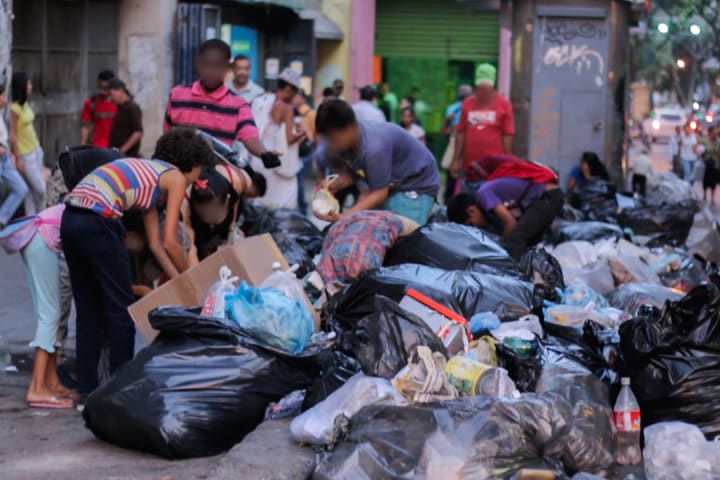Living In Venezuela Today Has A Very High Psychological Cost
Those who are left with families fractured by the largest exodus in the history of the continent, live an emotional conflict in addition to the political and economic crisis.

The Venezuelan crisis is economic, political, and also emotional. The exodus of hundreds of thousands of compatriots fleeing from hyperinflation, scarcity, violence, and misery fractures families and breaks the national soul. As a consequence, a new division is created in this republic already divided into a thousand pieces: those who stay and those who leave.
It is an exodus of "More than 2.3 million people who have fled Venezuela in recent years," according to the spokesman of the United Nations (UN), Stephane Dujarric.
The regional impact and the truly alarming numbers include long walks and bus trips of up to 2,900 kilometers to reach one of the preferred destinations for Venezuelans today: Peru.
Faced with such a panorama, and although under the "red revolution" everything looks black, clinical social psychologist Yorelis Acosta called for hope. "I believe that we should not live the separations from tragedy."
Acosta, a researcher at the Central University of Venezuela, rebels against defeatism, and supports those who continue to bet on their land.
How is the current exodus affecting Venezuelans emotionally?

What I have been studying, which I have called "the emotions of the crisis," is in principle a predominance of negative emotions. Fear, anger, sadness, frustration, a lot of discomfort. But, in addition, emotions are appearing that are very new, and therefore very difficult to handle and identify.
One side of the Venezuelan crisis is the emigration, but it is not the only thing, for that reason the effect is greater both in the one that goes, and in the one that stays, because we carry in the back, the effect of the other dimensions of the crisis, and the time that we have in crisis.
It is not a 2018 or 2017 crisis, but to the outside world, it seems that the issue of emigration is from recent months, when we have seen these images of people fleeing the country.
People emigrated, but right now people are fleeing like a stampede. The Venezuelan feels bad, exhausted; this emotional sway, which goes up and down according to the expectations of change, ends up exhausting the body and mind, and consequently, there is a predominance of negative emotions.
Everything looks dark.
This predominance of negative emotions means that we do not have the most adequate perception of the present and the future. Perception is altered according to the predominant emotion.
We are seeing the situation with the lenses of pain, suffering, maximum tragedy, no way out, and that is increased, because we did not have a history of emigrating, as did Europe, and other South American countries.
We did not have a history of emigrating, and that is why some are doing well, those who have been more prudent and planned their departure, and others very badly, those who want to walk, who are like the third wave of the poorest people, who have no idea of geography, of the difficulties they are going to encounter, of the fact that you need documents to travel.
Is the exodus shaking the foundations of the Venezuelan family?

Not having that history of emigrating is breaking the dynamics of the family, so we have older people and children who are being left alone, couples who come to agreements where one goes to work, and the other stays with the children.
I have a reference to a man who threw himself out the window in front of the children, because in his case they agreed that the lady would go to work, because her career could be better paid, and here he stayed with the children and the man couldn't stand it.
Actually, living in Venezuela today has a very high psychological cost. But he also has it for those who leave and don't prepare themselves. I don't think you have to live the separations from the tragedy, because today technology allows you to be in contact with people despite the distance. The country's situation and the emotional tiredness that we have is making us not see these things well, and focus only on the negative.
No one seems to be prepared for a situation like the current one, especially in a country that does not have that tradition of emigrating. How can the family prepare emotionally to face separation?
We are like a swarm of bees, what happens to you is felt by the whole family. That is why it has been difficult to assimilate this new situation of families with all their members distributed in different latitudes.
What I have seen of other cultures with this history of emigrating is that they have short roots, are more independent, and are resolved in small groups and not large as we Venezuelans are used to. The other thing is that Venezuelan emigration today crosses all social classes. The rich were used to leaving, but now the poorest are also leaving, and are affected by it.
Trying to divide the phenomenon into two parts: how does the Venezuelan who leaves feel, and how does the Venezuelan who stays and lives in the midst of this chaos feel?

We weren't prepared for such a serious situation, we don't know how to deal with hyperinflation, which is too hard. We have to change culturally those ways of relating, in the case of those who are going to have to learn another cultural scheme, institution, and so on.
But I think that the big problem is to go on an adventure, pushed by the crisis, because we would have to prepare ourselves better for that game.
I want to believe that those of us who are left behind are because we are using reason to look for opportunities; there are people within the crisis who are finding some veins.
Then there are others who are convinced that one way to face the crisis and continue in your country, keeping your conquests as an interesting job, and your housing, is to work more, to have two or three jobs to withstand hyperinflation.
Not everyone wants to leave, because we love this country and we want to fight for it. There are several types of people who are outside, some of them are the ones who started to look at Venezuela and say: what are you doing there that you don't leave? I don't talk to those people.
Is the one who stays "crazy"? Where can a person cling to convince himself that it is best to stay in the country in spite of the crisis?

Not everyone who has left is doing well, there is a lot of pain, a lot of suffering. This is really a shock, and you have to look for specialized help if you don't know how to manage the distance, make cultural changes, and manage emotions better.
They must try not to see things from the tragedy, and if we cannot do it alone, or in a family, we have to seek specialized help.
For those of us who, like myself, have gambled and reinvented ourselves—it is enough to review the many examples of entrepreneurship in the midst of the crisis—it is not crazy to stay.
We know that we are at the end of the crisis, so we have to put up with it. These arguments allow you to defend yourself from those who think that staying is a crazy thing to do.
About the Creator
HowToFind .com
More info at https://howtofind.com






Comments
There are no comments for this story
Be the first to respond and start the conversation.